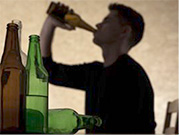|

|
|
The views expressed on this page are soley
those of the author and do not
necessarily represent the views of County
News Online
|
 |
Start Talking!
Know! the Link Between Alcohol and Sexual Assault
11/6/2019
Alcohol is NEVER an acceptable excuse for sexual assault. Alcohol is,
however, the substance used most frequently to assist in sexual
assault. The connection between the two is complex.
A false assumption exists that when alcohol is involved in a sexual
assault, it somehow lessens the crime—as if the perpetrator is somehow
less responsible for his or her actions if he or she had been drinking,
and the victim is somehow more responsible if he or she had been
drinking. This is wrong. There is zero evidence showing that drinking
causes a person to commit such an act. There is research however, to
show that alcohol is used to target victims and then used by
perpetrators as an excuse for their actions.
Alcohol is our nation’s number one health problem among both youth and
adults. By the age of 15, about one in three teens will have had at
least one alcoholic drink, and by 18 more than half of all teens will
have experimented with alcohol. Research proves time and again that
when drinking begins at younger ages, those youth are more likely to
have problems with drinking later in life.
In previous Know! Tips, it has been discussed that alcohol is
responsible for negative physical and mental health consequences, can
harm relationships and leads to problems in school and work. However,
it does not hold up as a defense for criminal behavior – no blame for
the assault should be put on the survivor, regardless of whether they
drank prior to the assault.
Alcohol isn’t responsible for a person’s choices, but it does play a
role in poor decision making, including criminal behavior. The link
between alcohol and sexual assault is clear. Because of this, we need
to discuss that link when we talk to our children about alcohol.
Here are some key stats to Know! when discussing alcohol, sexual assault and the connection between them:
One in four girls will become a victim of sexual assault in their lifetimes.
Between 75-85 percent of sexual assault victims know their assailant—they are not strangers.
18 percent of girls and 3 percent of boys will become victims of a
sexual assault or abuse at the hands of another adolescent by the time
they turn 17.
Half of all sexual assaults involve alcohol—consumed by the victim, the perpetrator, or both.
One in 10 high school drinkers and one in eight high school binge
drinkers report being physically forced to have sexual intercourse.
Research conducted by the National Institute on Alcohol Abuse and
Alcoholism shows that while there is not a direct cause and effect,
alcohol may contribute to sexual assault through multiple pathways.
Alcohol use by a potential assailant can lead to increased aggressive
behavior and a decreased ability or concern when interpreting a
female’s (or male’s) sexual interest accurately. Females who had been
drinking when an assault took place reported that their intoxication
caused them take risks that they would normally avoid and made it more
difficult for them to resist an assault or sexual advance.
The impact of sexual assault during adolescence can be severe and long-
lasting. Victims are at increased risk for depression, anxiety and
post- traumatic symptoms, and tragically are at a higher risk for being
assaulted again. Such trauma in adolescence also places youth at a
greater likelihood for making hazardous life choices, which oftentimes
lead to substance abuse, eating disorders and risky sexual behaviors.
Society largely tends to send the message that drinking is a rite of
passage for youth and that alcohol provides innocent and harmless fun.
This couldn’t be further from the truth—adolescents and alcohol are a
toxic mix. Allowing or turning a blind eye to underage drinking is not
only illegal, but a disservice to your child or any young person
involved—and potentially sets the scene for an assault to occur.
In a future Know! tip, we will provide tips for talking to our
daughters and sons about the dangers of drinking, the link between
alcohol and assault, and we’ll share information they need to Know! to
avoid becoming a victim or perpetrator of sexual assault.
Learn how to get your drug abuse prevention conversation started at StartTalking.Ohio.Gov.
|
|
|
|

